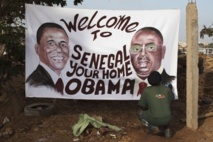
Artist Ouzin puts the finishing touches on a painting honoring the upcoming visit to Dakar by President Obama. Senegalese President Macky Sall is pictured on the right of the painting.
Addressing parliament, Obama stood in front of the nation’s tricolor flag, a banner reading “Yes Together We Can” hanging from the balcony.
“I have the blood of Africa within me,” Obama declared during a 30-minute address in which he hailed “a new moment of great promise” for the continent.
The feeling was mutual. “We Africans celebrated him as one of our own,” Robert Alai, a well-known Kenyan blogger, recalled recently of the first black U.S. president, whose father was from Kenya.
Four years later, as Obama heads back to the continent Wednesday for a week-long trip to Senegal, South Africa and Tanzania, he can expect a welcome that is still warm and enthusiastic — but tinged with an unmistakable sense of disappointment after a first term that many Africans believe did not live up to Obama’s lofty promises.
The Obama administration’s record, policy analysts in Washington and Africa said, has not been defined by greater economic investment and diplomacy. According to the Congressional Research Service, U.S. aid to Africa rose from $1.1 billion in 2006 to $8.2 billion in fiscal 2009 — an amount set during George W. Bush’s final year in office — before dipping to$6.9 billion in 2011.
The president’s food security, global health and climate change initiatives have been overshadowed by more aggressive U.S. military operations to establish a hub for counterterrorism operations on the continent, including drone bases and increased Navy warship missions. At the same time, other countries, led by China, India and Brazil, have ramped up their investments and trade partnerships with a continent that boasts six of the world’s 10 fastest-growing economies, albeit each one still very small compared to other regions.
The contrast will be highlighted during Obama’s journey by a simultaneous trip to Africa by Bush, who is scheduled to be in Tanzania at the same time. The two men have no plans for a joint appearance, but their wives, Michelle Obama and Laura Bush, will take part in a first ladies summit there hosted by the George W. Bush Institute.
What makes the criticism of Obama’s record particularly stark is that his two most recent predecessors — Bush and Bill Clinton — are remembered fondly for their ambitious health initiatives in Africa, including a major fight against HIV/AIDS.
“Africans still consider Clinton their president. If you go to Africa and mention Clinton, he is a hero, even today,” said Mwangi Kimenyi, a Kenyan who is the director of the African Growth Initiative at the Brookings Institution. “I don’t think President Obama is going to approach the level of President Clinton at all, in terms of respect, in terms of what they feel.
“What I see when I go to Africa is people are very cynical,” Kimenyi continued. “There is not that feeling that we have our son there. There’s probably more [a sense] of a prodigal son.”
It is a developing legacy that Obama is eager to turn around in his final 3 1 / 2 years, and this week’s trip is intended as a clear signal that things will be different going forward, senior administration officials said.
By David Nakamura and Sudarsan Raghavan
washingtonpost
“I have the blood of Africa within me,” Obama declared during a 30-minute address in which he hailed “a new moment of great promise” for the continent.
The feeling was mutual. “We Africans celebrated him as one of our own,” Robert Alai, a well-known Kenyan blogger, recalled recently of the first black U.S. president, whose father was from Kenya.
Four years later, as Obama heads back to the continent Wednesday for a week-long trip to Senegal, South Africa and Tanzania, he can expect a welcome that is still warm and enthusiastic — but tinged with an unmistakable sense of disappointment after a first term that many Africans believe did not live up to Obama’s lofty promises.
The Obama administration’s record, policy analysts in Washington and Africa said, has not been defined by greater economic investment and diplomacy. According to the Congressional Research Service, U.S. aid to Africa rose from $1.1 billion in 2006 to $8.2 billion in fiscal 2009 — an amount set during George W. Bush’s final year in office — before dipping to$6.9 billion in 2011.
The president’s food security, global health and climate change initiatives have been overshadowed by more aggressive U.S. military operations to establish a hub for counterterrorism operations on the continent, including drone bases and increased Navy warship missions. At the same time, other countries, led by China, India and Brazil, have ramped up their investments and trade partnerships with a continent that boasts six of the world’s 10 fastest-growing economies, albeit each one still very small compared to other regions.
The contrast will be highlighted during Obama’s journey by a simultaneous trip to Africa by Bush, who is scheduled to be in Tanzania at the same time. The two men have no plans for a joint appearance, but their wives, Michelle Obama and Laura Bush, will take part in a first ladies summit there hosted by the George W. Bush Institute.
What makes the criticism of Obama’s record particularly stark is that his two most recent predecessors — Bush and Bill Clinton — are remembered fondly for their ambitious health initiatives in Africa, including a major fight against HIV/AIDS.
“Africans still consider Clinton their president. If you go to Africa and mention Clinton, he is a hero, even today,” said Mwangi Kimenyi, a Kenyan who is the director of the African Growth Initiative at the Brookings Institution. “I don’t think President Obama is going to approach the level of President Clinton at all, in terms of respect, in terms of what they feel.
“What I see when I go to Africa is people are very cynical,” Kimenyi continued. “There is not that feeling that we have our son there. There’s probably more [a sense] of a prodigal son.”
It is a developing legacy that Obama is eager to turn around in his final 3 1 / 2 years, and this week’s trip is intended as a clear signal that things will be different going forward, senior administration officials said.
By David Nakamura and Sudarsan Raghavan
washingtonpost



